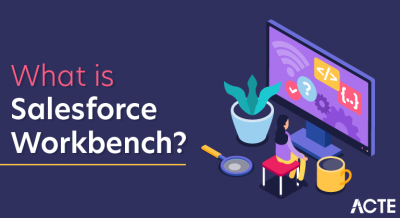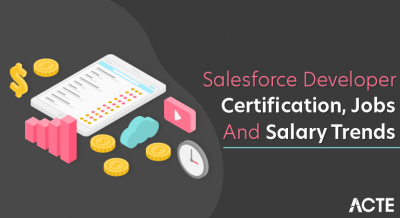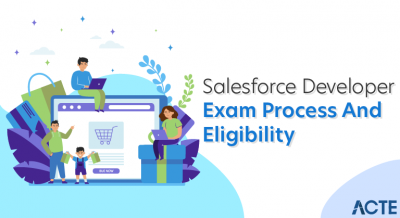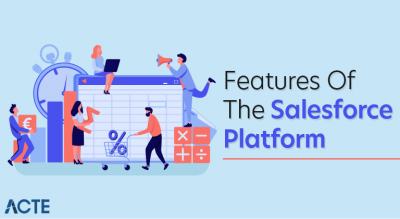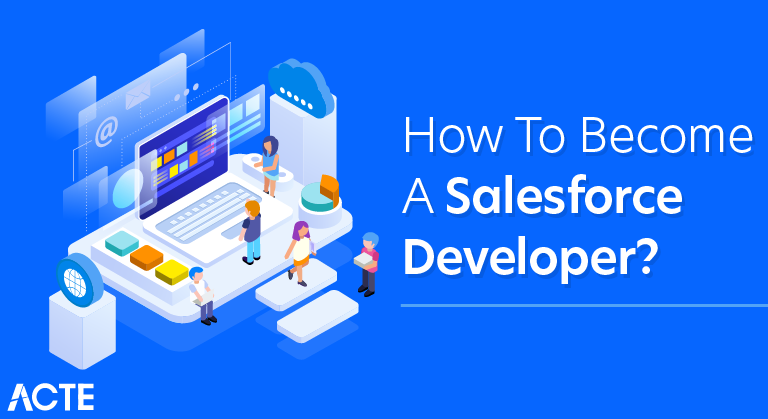
A Salesforce Developer is a Software Developer who specializes in the development of software and products for users of the software company Salesforce.com, often using Salesforce’s proprietary programming languages.

Tasks and duties
- Gathering project requirements by liaising with clients, team members and stakeholders.
- Designing solutions and features that meet the project requirements.
- Writing and modifying programming code.
- Testing code for bugs and implementing improvements and fixes.
- Solving problems using logic and methodical testing processes.
- Developing testing and validation processes.
- Deploying code to the live environment.
If you’re looking to build a prosperous career in the Salesforce ecosystem, becoming a Certified Salesforce Administrator is one of the most tried-and-true first steps. But, before you embark on this journey, it’s important to know what to expect, where to begin and how to pass the test the first time. This piece will serve as an overview for those curious about becoming a Salesforce Admin, as well as a guide to successfully get started.
‘What Does it Take to be a Salesforce Admin?’
Every successful Salesforce Admin should possess the ability to think critically, adapt on the fly and maintain a technical process with many moving parts. Need someone who can add 90 new users, each with a slightly different permission set? Your Salesforce Admin has you covered. Or, how about someone who can build a process to add specific leads to a campaign, while also preventing duplicate lead creations? Ask your Admin.
‘What are their Core Responsibilities?’
Salesforce is a dynamic tool that requires a skilled and versatile Salesforce Admin to manage it – especially for enterprise companies. Consider that most organizations only have one Salesforce Admin, and you start to grasp the importance of the role. What’s more, as the gatekeeper for companies’ Salesforce org, Salesforce Admins are the lead for several core business processes, including running reports, implementing integrated technologies, managing and setting permissions and maybe even training new end-users.
‘How’s the Job Market for Salesforce Admins?’
Due to their core responsibilities, the demand for quality Salesforce Admins has never been greater. According to a recent report from Burning Glass, “Salesforce is now the seventh most in-demand software skill, up from No. 18 just four years ago. That puts the demand for Salesforce [skills] ahead of IT stalwarts such as Python, .Net and C++, and in line with commonly used applications, such as Adobe Photoshop.” So, needless to say, the decision to become an Admin offers little risk and a high ceiling.
Community
It’s something that often comes up when we speak with professionals as part of our #Salesforce QA series. Something that is echoed by the people we speak with is that the Salesforce ecosystem is notoriously welcoming, helpful, and collaborative. Salesforce CRM Lead, Will Turner says of the community; “I know of no other technology that has a community on such a scale or is as passionate for genuinely encouraging success, like the Salesforce community.” Working with Salesforce, you’ll never be short of guidance, support, and community.
- There are numerous Salesforce community groups and meetups all over the world. So, no matter where you’re based, you can always find a group of like minded professionals to share experiences with and learn from. We host Salesforce meetups in London, New York and Germany on a range of topics and always encourage people to come along and interact with the community.
Training and development
- Salesforce is renowned for having one of the most comprehensive training offerings in tech; and even better, it’s free. Trail head offers dedicated learning paths for every experience level, every product, and every job role.
- The online learning platform helps Salesforce professionals to up skill in their own time. The platform is an extremely beneficial careers tool and allows professionals to connect with their peers for advice and support on career their journey within the ecosystem.
- Trail head has quickly dominated the Salesforce space in terms of learning. There are hundreds of thousands of users and more than 4.5 million badges have been earned by professionals in the ecosystem. As a result, it is now the go-to for anyone looking to expand their Salesforce knowledge.
£££
- As we’ve mentioned before, there is a fantastic earning potential with Salesforce. With Salesforce customers in competition for the best talent, the ecosystem’s issue with supply and demand is driving up wages. And as a Salesforce Developer you’ll certainly benefit from the competitive nature of the market.
- According to Indeed the average salary for a Salesforce Developer in the UK is around £57,000 and in the US is around $115,000. Hourly rates for freelance Salesforce Developers are impressive too. And specializing in Salesforce programs, like Sales Cloud or Visual force, can boost your earning potential even further. Salesforce certifications can also have a very positive impact on your worth too.
Opportunities and innovation
- We’ve said it before and we’ll say it again, demand for Salesforce professionals is increasing rapidly. An issue the ecosystem is facing at the moment, is that demand is much higher than supply across all Salesforce roles. Of course, this includes Salesforce Developers.
- This is great news for developers you’ll have plenty of roles and companies to choose from when it comes to looking for a new position. You’ll also have leverage to negotiate salary, benefits, and working conditions.
- Salesforce releases updates and new features every year. Salesforce is all about innovation, so you can be sure that you’ll be working with some of the latest advancements in tech. And Salesforce Developers are never at the back of the line when it comes to getting access to these cutting-edge developments.
- So, if you’re interested in working with some of the most cutting-edge technologies, a career as a Salesforce Developer could definitely be for you.
- If you’re thinking of taking the steps to become a Salesforce Developer, there’s no time like the present. With such a competitive market and the demand for developers higher than ever, now is definitely the right time to start your journey.
- For a confidential conversation about your Salesforce career, and to hear about our latest roles, get in touch with our specialist Salesforce consultants today!
The Role of a Salesforce Developer
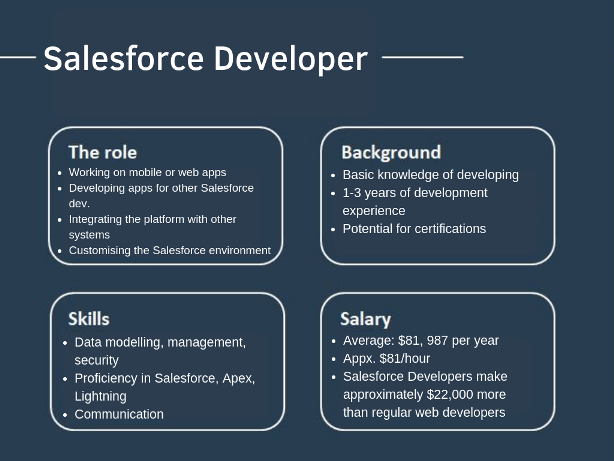
What is Salesforce?
Salesforce is a CRM platform hosting a group of technologies that support the development of other technologies on top of it, from building full-scale apps and software to developing a simple web page. It features a wide range of tools from app analytics to B2B marketing solutions and comes with many benefits including data security, testing and more.
- A Salesforce developer will be working on the Salesforce platform, but as Salesforce is such a varied topic, the responsibilities of a Salesforce developer can also be massively varied.
Typical tasks might include:
- Working on mobile or website applications
- Developing apps for other Salesforce developers
- Integrating the platform with other systems
- Customizing the Salesforce environment for the developer’s particular client
What Do I Need to Learn to Become a Salesforce Developer?
Salesforce is an extremely vast topic in which one can specialize, but the good news is that because of this, anyone can build up at least some proficiency in the platform in a short period of time.
- Many Salesforce developers will start off with a basic knowledge of developing, and may also already be Salesforce Administrators. Salesforce Administrators are required to have a broad knowledge of the platform and how to manage applications within the software, making this a good base point from which to start.
To become a Salesforce Developer, you may need to specialize in the following areas:
- Data modeling, management, and security
- Platform development
- Salesforce app customization
- Visualforce basics
- Search solutions basics
- Developer console
- Salesforce object query language
- Apex object-oriented programming
- Lightning framework
Do I Need A Salesforce Developer Certification?
- It is recommended that you get Salesforce Developer certification if you want to pursue this as a serious freelance career. Salesforce even has its own education center – Salesforce University – to help people become certified on the platform.
- There are several certification options (depending on how advanced you are as a developer) that you can work towards:
Salesforce Certified Platform App Builder
- The Platform App Builder certification is targeted towards developers who have experience in developing custom applications on the Force.com platform (Salesforce’s very own developer platform).
- Having this certification will prove that you are comforting with the Lightning app builder and that you are experienced in the declarative part of Salesforce.
Salesforce Certified Platform Developer I
- The Platform Developer I certification is ideal for developers with 6 months – 1-year experience developing applications on any platform. Ideally, you should also have 6 months+ of experience using the Force.com platform.
- This certification will show you are proficient in building custom apps on the Force.com platform, and that you can also use Apex and Visual force on the SaaS side of Salesforce.
Salesforce Certified Platform Developer II
- You must first be a certified Platform Developer before getting this certification. This certification is for developers with around 2 – 4 years of experience of a developer, and a minimum of 1 years’ experience on the Force.com platform.
- People who have this certification will typically have mastered Apex and Visual force on Salesforce, and will also be fairly proficient with the SOAP, Heroku, and Lightning components of the platform.

